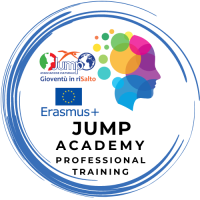
EMOTIONAL COMPETENCES. Developing Emotional Intelligence In Teachers And Students
“Emotional competence” is defined as the functional capacity wherein a human can reach their goals after an emotion-eliciting encounter. This training will help educators improve their teaching method, by reflecting and increasing their knowledge on the main topics, widening perspectives and broadening their work to new cooperations with colleagues and international educators.
Description
More info here https://associazionejump.it/course/emotional-competences/
Emotional and social development are essential in personal and professional life. This course explores “emotional competence,” the skill to understand and manage one’s own emotions and relate empathetically to others. Drawing on key theories by Saarni, Goleman, and Gardner, participants learn about core emotional skills such as self-awareness, empathy, emotional vocabulary, and self-regulation. The training supports educators in improving their teaching methods to foster these competencies in students and adults alike. Emphasis is placed on active listening, conflict management, and social competence to promote better communication and relationships in the classroom and beyond. Through practical exercises and reflection, teachers gain tools to integrate emotional learning into their practice, aligning with European lifelong learning guidelines and preparing learners for academic and social success.
Learning objectives
- Having a common understanding and awareness about Emotional competences and their development at school
- Practicing activities to develop self awareness and social competence
- Discovering tools and exercises useful for educational purposes
- Improving communication skills
- Learning to plan activities to develop emotional competence in adults and in students
Methodology & assessment
Furthermore, in line with the JUMP Academy method, our courses are based on a strategic balance between formal and non-formal education, indoor and outdoor education and the team takes care of a very important aspect of international mobility which is the intercultural learning which we develop with short excursions and facilitating the interaction with local partners, businesses and citizens of our territory. Each local context has its own economy so it’s always useful, in training programs, to get in contact with concrete examples (experiential learning and real based learning).
We always try to connect our learners to local teachers and students to cooperate in developing innovation and networking for future projects.
Materials, digital tools & other learning resources
JUMP provides, after the completion of the course, all presentations, training materials and any other digital and learning tools used during the training sessions. Furthermore, extra materials are sent if there are updates and new ones researched afterwards.
Certification details
At the end of the training, JUMP delivers a formal certificate of attendance and the team is at disposal to fill the Europass certification document according to the EU model template and other needed documents for reporting of the sending institution.
Our courses are in line with the Erasmus+ Quality standards for courses under Key Action 1 (learning mobility of individuals)
Pricing, packages and other information
-
Course package content:
In the course fee are included: organization, administration, trainers' costs and classes, further training/learning materials, certification, support of the team H24, photo-video reporting.
Extra costs are referred to logistics. JUMP is sending all the precise info when the participants or the Erasmus coordinator ask for information.
-
Additional information:Description of the services and activities included in the course package (such as accommodation, meals, transport) or available at extra cost.
-
Cancellation & changes:
With a proper time in advance is possible to cancel the participation, informing and explaining the motivation.
-
Additional information:The options and conditions for change and cancellation, and the policy in case of unforeseen circumstances (force majeure).
Additional information
-
Language:English
-
Target audience ISCED:Primary education (ISCED 1)Lower secondary education (ISCED 2)Upper secondary education (ISCED 3)
-
Target audience type:TeacherPedagogical AdviserSchool Psychologist
-
Learning time:25 hours or more
Upcoming sessions
Past sessions
More courses by this organiser

LET’S BOOK TRAILERS@SCHOOL. Innovative Methods To Engage Students, Promote Reading And Enhance Literacy And Digital Skills

MINDFULNESS AT SCHOOL. Mindful Teachers – Mindful Students


